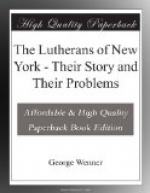The Problem of Religious Education
Historically and doctrinally the Lutheran Church is committed to week-day instruction in religion. Historically, because in establishing the public school her chief purpose was to provide instruction in religion; doctrinally, because from her point of view life is a unit and cannot be divided into secular and spiritual compartments.
American Christians are confronted with two apparently contradictory propositions. One is that there can be no true education without religion. The other is that we must have a public school, open to all children without regard to creed.
When our country was young, and Protestantism was the prevailing type of religion, these two ideas dwelt peacefully together. The founders of the Republic had no theory of education from which religion was divorced. But the influx of millions of people of other faiths compels us to revise our methods and to test them by our principles, the principles of a free Church within a free State. Roman Catholics and Jews object to our traditions and charge us with inconsistency. If temporarily we withstand their objections, we feel that a great victory has been won for religion when a psalm is read and the Lord’s Prayer said at the opening of the daily session of school. We still have “religion” in the publie school.
But the problem remains. On the one hand, those who doubt the propriety of introducing any religious instruction, however attenuated, into the public school, are not satisfied with the compromise. There are judicial decisions which place even the reading of the Bible under the head of sectarian instruction.
On the other hand, those who believe that religion has a supreme place in the education of a child, and that provision should therefore be made for it in its school life, realize the inadequacy of the present methods.
As Herbert Spencer says: “To prepare us for complete living is the function which education has to discharge.” Character rather than acquirement is the chief aim of education. Hence we cannot ignore the place of religion in education without doing violence to the ultimate purpose of education.
The importance of the question is admitted on all sides. But it remains a complex and difficult problem. Thus far, with all our talent for practical measures, we have not succeeded in reaching a solution.
In New York, in common with other churches, we have the Sunday School. We do not undervalue its influence and cannot dispense with its aid. But does the Sunday School meet the requirement of an adequate system of religious instruction? It is an institution that has endeared itself to the hearts of millions. Originally intended for the waifs of an English manufacturing town, it has become among English-speaking people an important agency of religion. Apart from the instruction




